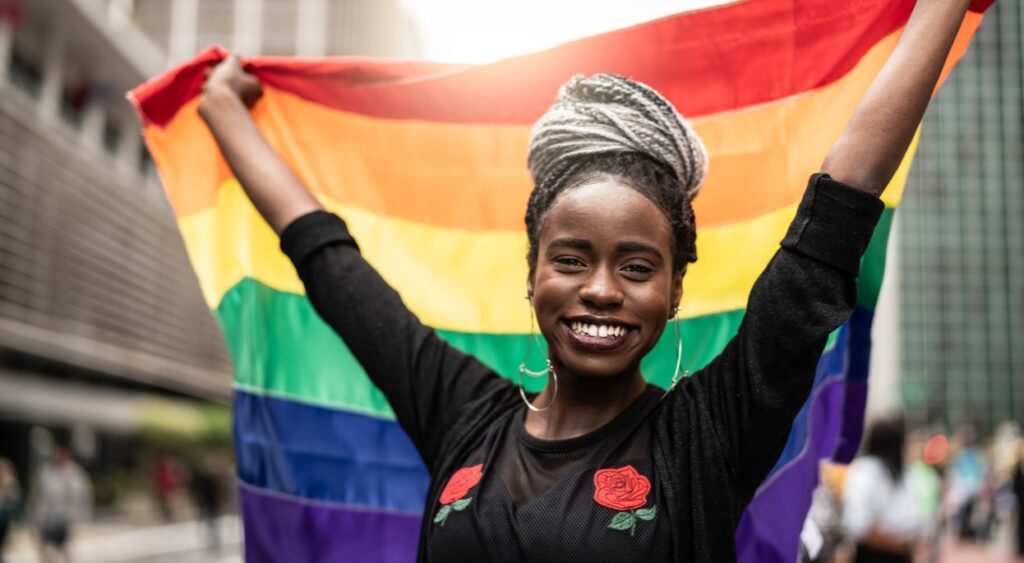Businesses have realised the importance and profitability of working with the LGBT+ communities. But employers should recognise that popping up during Pride and disappearing for the rest of the year is unhelpful. Support for LGBT+ employees must be provided on a consistent basis throughout the year.
There has been an increasing need for businesses to consider how they support and recognise LGBT+ employees throughout the year, as more people have the courage to self-identify as not 100% heterosexual or cis-gender than ever before.
As this February marks LGBT History Month, I was drawn to new government research – the largest national survey of LGBT people in the world to date – showing that LGBT respondents are less satisfied with their life than the general UK population.
At least 2 in 5 respondents had experienced an incident because they were LGBT, such as verbal harassment or physical violence, in the last 12 months. And more than a third also said they had avoided holding hands with a same-sex partner for fear of a negative reaction.
Despite our progress as a society, these figures are still shocking in 2019. They underline the fact that there needs to be more support at home, out on the street and within the workplace.
We can all contribute support in and out of our homes, but increasingly employers have a responsibility to take the lead by supporting LGBT+ employees throughout the year, not just at one moment.
As an employee of Amazon, back in 2015 I was given the freedom and time to form the UK chapter of glamazon, the company’s network for LGBT+ employees and allies, which helps the business create a safer space for employees to ask questions, challenge the set ways and feel empowered to bring their authentic self to work.
Over these past few years, we have collected key learnings while building a culture of inclusion for all. Here are some pointers that may help your business become more LGBT+ inclusive:
LGBT+ inclusion is good for business
Besides being the right thing to do, diversity and inclusion are also linked to innovation and productivity. For multinational organisations, innovation is crucial to our success.
A diverse workforce gives you a better understanding of customers’ needs and is key to unlocking new ideas. How could a business cater for millions of potential customers from the LGBT+, BAME or disabled communities without a deep understanding of their experiences?
In a global economy where competition for top talent is fierce, LGBT+-inclusive workplaces also create a competitive advantage by helping companies to attract and retain top talent. Happy employees will always be more productive, more likely to stay at the organisation and more likely to sing its praises externally.
Loud, proud leadership from the top is vital.
We must also consider the influence multinational companies have overseas. Creating an inclusive and accepting work environment, with a consistent culture across the world, allows LGBT+ employees to find a safe haven at home and when they are travelling, even if local laws may not be as progressive as their own country.
These messages should filter down throughout the entire business and senior leadership/management may need regular training to freshen up their thinking with regards to inclusion.
Employee Resource Groups are the key to engagement
Voluntary and employee-led resource groups like glamazon are a brilliant way to give any workforce a platform to share their experiences and to support each other either formally or informally.
Such groups can provide your company with vital feedback and can help your employees to engage the wider community through advocacy, events, training and much more.
Clear guidelines, show support and simplify bureaucracy
It’s important to ensure that everyone feels welcome and comfortable to be who they are from day one. This has to start with robust company policies.
Public debate around transgender rights and gender identities has grown since a government consultation last year proposed changes to the Gender Recognition Act of 2004.
As a business, creating policies, such as our transgender guidelines, can help to bring clarity, purpose and understanding to that debate – for example by supporting colleagues on key issues such as bathrooms, uniforms and preferred pronouns.
Another simple change is to allow employees to add their preferred pronouns to your company’s internal directory page.
Company policies are the bare minimum
It’s also important to note that company policies, no matter how robust or detailed, will be ineffective without the widespread support and adoption of everybody from senior leaders down. Policies should be the basis of a broader culture of inclusion and diversity rather than the full extent of the company’s efforts.
Improved ways of working on a day-to-day basis will be an important way to tackle discrimination and unconscious bias, while simple initiatives and habits that drive objective decision making will always deliver better outcomes than any policy.
For example, to reduce unconscious bias ensure that documents being presented in meetings do not carry a named author and that decisions are based on data and evidence rather than whoever has the loudest voice.
Foster allies’ support
Well-informed allies will be empowered to influence others, challenge negative views and support colleagues. The most powerful thing allies can say is ‘that’s not okay’, and challenge casual conversations, language in documents and inclusivity in meetings.
Loud, proud leadership from the top is vital – managers and directors set the tone on a day-to-day basis, and they should always be encouraged to understand the deeper issues at hand alongside the wider benefits of a fully inclusive culture.
No matter how diverse and forward-thinking, organisations and individuals may still have blind spots to sensitive issues.
That support should filter down through individual teams, and it doesn’t need to be complicated. Other forms of support include displaying the rainbow flag, using rainbow lanyards, stationary and avatar ribbons throughout the year.
Engage with the community
Not every business can do every single thing to support the LGBT+ community, but actively listening to those concerns and understanding the lived experience is always a good way to start.
No matter how diverse and forward-thinking, organisations and individuals may still have blind spots to sensitive issues. Sometimes this can result in well-meaning interactions that come across as negative, prejudiced or rude.
In truth, no amount of training, awareness or advocacy can replicate the lived experience of somebody who considers themselves a member of the LGBT+ community. Those experiences vary hugely, and they all need to be considered equally. Taking the time to listen and understand is something that any organisation can and should do.







